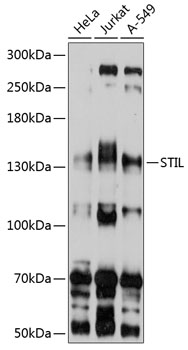Anti-STIL Antibody (CAB10350)
- SKU:
- CAB10350
- Product type:
- Antibody
- Reactivity:
- Human
- Host Species:
- Rabbit
- Isotype:
- IgG
- Antibody Type:
- Polyclonal Antibody
- Research Area:
- Cell Biology
Frequently bought together:
Description
| 抗体名: | Anti-STIL Antibody |
| 抗体コード: | CAB10350 |
| 抗体サイズ: | 20uL, 50uL, 100uL |
| 申し込み: | WB |
| 反応性: | Human |
| 宿主種: | Rabbit |
| 免疫原: | Recombinant fusion protein containing a sequence corresponding to amino acids 1218-1287 of human STIL (NP_003026.2). |
| 申し込み: | WB |
| 推奨希釈: | WB 1:500 - 1:2000 |
| 反応性: | Human |
| ポジティブサンプル: | HeLa, Jurkat, A-549 |
| 免疫原: | Recombinant fusion protein containing a sequence corresponding to amino acids 1218-1287 of human STIL (NP_003026.2). |
| 精製方法: | Affinity purification |
| ストレージバッファ: | Store at -20'C. Avoid freeze / thaw cycles. Buffer: PBS with 0.02% sodium azide, 50% glycerol, pH7.3. |
| アイソタイプ: | IgG |
| 順序: | LVKN LKPS PAVN LRTG KAEF TQHP EKEN EGDI TIFP ESLQ PSET LKQM NSMN SVGT FLDV KRLR QLPK LF |
| 遺伝子ID: | 6491 |
| Uniprot: | Q15468 |
| セルラーロケーション: | Cytoplasm, cytosol |
| 計算された分子量: | 142kDa/143kDa |
| 観察された分子量: | 143kDa |
| 同義語: | STIL, MCPH7, SIL |
| バックグラウンド: | This gene encodes a cytoplasmic protein implicated in regulation of the mitotic spindle checkpoint, a regulatory pathway that monitors chromosome segregation during cell division to ensure the proper distribution of chromosomes to daughter cells. The protein is phosphorylated in mitosis and in response to activation of the spindle checkpoint, and disappears when cells transition to G1 phase. It interacts with a mitotic regulator, and its expression is required to efficiently activate the spindle checkpoint. It is proposed to regulate Cdc2 kinase activity during spindle checkpoint arrest. Chromosomal deletions that fuse this gene and the adjacent locus commonly occur in T cell leukemias, and are thought to arise through illegitimate V-(D)-J recombination events. Multiple transcript variants encoding different isoforms have been found for this gene. |
| UniProt Protein Function: | STIL: Immediate-early gene. Plays an important role in embryonic development as well as in cellular growth and proliferation; its long-term silencing affects cell survival and cell cycle distribution as well as decreases CDK1 activity correlated with reduced phosphorylation of CDK1. Plays a role as a positive regulator of the sonic hedgehog pathway, acting downstream of PTCH1. A chromosomal aberration involving STIL may be a cause of some T-cell acute lymphoblastic leukemias (T-ALL). A deletion at 1p32 between STIL and TAL1 genes leads to STIL/TAL1 fusion mRNA with STIL exon 1 slicing to TAL1 exon 3. As both STIL exon 1 and TAL1 exon 3 are 5'-untranslated exons, STIL/TAL1 fusion mRNA predicts a full length TAL1 protein under the control of the STIL promoter, leading to inappropriate TAL1 expression. In childhood T-cell malignancies (T-ALL), a type of defect such as STIL/TAL1 fusion is associated with a good prognosis. In cultured lymphocytes from healthy adults, STIL/TAL1 fusion mRNA may be detected after 7 days of culture. Defects in STIL are the cause of microcephaly primary type 7 (MCPH7). Microcephaly is defined as a head circumference more than 3 standard deviations below the age- related mean. Brain weight is markedly reduced and the cerebral cortex is disproportionately small. Despite this marked reduction in size, the gyral pattern is relatively well preserved, with no major abnormality in cortical architecture. Primary microcephaly is further defined by the absence of other syndromic features or significant neurological deficits. 2 isoforms of the human protein are produced by alternative splicing. |
| UniProt Protein Details: | Protein type:Cell cycle regulation; Cell development/differentiation; Oncoprotein Chromosomal Location of Human Ortholog: 1p33 Cellular Component: centriole; centrosome; cytoplasm Molecular Function:protein binding Biological Process: cell proliferation; centrosome duplication; determination of left/right symmetry; embryonic axis specification; floor plate development; forebrain development; heart looping; in utero embryonic development; mitotic spindle organization and biogenesis; multicellular organism growth; negative regulation of apoptosis; neural tube closure; neural tube development; notochord development; regulation of centriole replication; smoothened signaling pathway Disease: Microcephaly 7, Primary, Autosomal Recessive |
| NCBI Summary: | This gene encodes a cytoplasmic protein implicated in regulation of the mitotic spindle checkpoint, a regulatory pathway that monitors chromosome segregation during cell division to ensure the proper distribution of chromosomes to daughter cells. The protein is phosphorylated in mitosis and in response to activation of the spindle checkpoint, and disappears when cells transition to G1 phase. It interacts with a mitotic regulator, and its expression is required to efficiently activate the spindle checkpoint. It is proposed to regulate Cdc2 kinase activity during spindle checkpoint arrest. Chromosomal deletions that fuse this gene and the adjacent locus commonly occur in T cell leukemias, and are thought to arise through illegitimate V-(D)-J recombination events. Multiple transcript variants encoding different isoforms have been found for this gene. [provided by RefSeq, Jul 2008] |
| UniProt Code: | Q15468 |
| NCBI GenInfo Identifier: | 122070597 |
| NCBI Gene ID: | 6491 |
| NCBI Accession: | Q15468.2 |
| UniProt Secondary Accession: | Q15468,Q5T0C5, Q68CN9, |
| UniProt Related Accession: | Q15468 |
| Molecular Weight: | 143kDa |
| NCBI Full Name: | SCL-interrupting locus protein |
| NCBI Synonym Full Names: | SCL/TAL1 interrupting locus |
| NCBI Official Symbol: | STIL |
| NCBI Official Synonym Symbols: | SIL; MCPH7 |
| NCBI Protein Information: | SCL-interrupting locus protein |
| UniProt Protein Name: | SCL-interrupting locus protein |
| UniProt Synonym Protein Names: | TAL-1-interrupting locus protein |
| Protein Family: | Stilbene synthase |
| UniProt Gene Name: | STIL |
View AllClose


